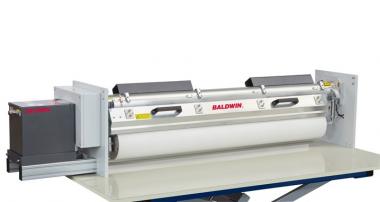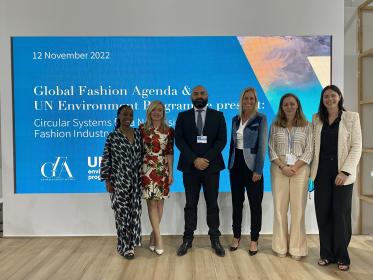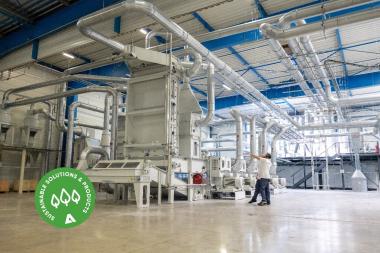Neues Mittelstand-Digital Zentrum Smarte Kreisläufe zum 01. März gestartet
- Mittelstand 4.0-Kompetenzzentrum Textil vernetzt planmäßig beendet
- Neues Mittelstand-Zentrum soll Unternehmen mit konkreten Ideen bei Digitalisierung und Nachhaltigkeit unterstützen
Das Mittelstand-Digital Zentrum Smarte Kreisläufe gehört zu Mittelstand-Digital. Mit dem Mittelstand-Digital Netzwerk unterstützt das Bundesministerium für Wirtschaft und Klimaschutz die Digitalisierung in kleinen und mittleren Unternehmen und dem Handwerk.
Das Netzwerk bietet mit den Mittelstand-Digital Zentren, der Initiative IT-Sicherheit in der Wirtschaft und Digital Jetzt umfassende Unterstützung bei der Digitalisierung. Kleine und mittlere Unternehmen profitieren von konkreten Praxisbeispielen und passgenauen, anbieterneutralen Angeboten zur Qualifikation und IT-Sicherheit. Das Bundesministerium für Wirtschaft und Klimaschutz ermöglicht die kostenfreie Nutzung und stellt finanzielle Zuschüsse bereit. Weitere Informationen finden Sie unter www.mittelstand-digital.de.
Unter der Federführung des Gesamtverbandes textil+mode werden gemeinsam mit den Partnern Deutsche Institute für Textil- und Faserforschung Denkendorf (DITF), Institut für Textiltechnik der RWTH Aachen University (ITA), Sächsisches Textilforschungsinstitut (STFI) und DER MITTELSTANDSVERBUND – ZGV kleine und mittlere Unternehmen bei der Einführung zukunftsrelevanter digitaler Technologien begleitet. Themen sind u.a. hohe Energie- und Rohstoffkosten, neue gesetzliche Regelungen in den Bereichen Lieferketten und Kreislaufwirtschaft, Arbeiten auf digitalen Plattformen und eine bedarfsgerechte Qualifikation der Belegschaft
Geschäftsführerin Anja Merker sieht das Thema Digitalisierung in den Unternehmen angekommen. „Künstliche Intelligenz, Robotik oder Blockchain sind keine Fremdwörter mehr. Eingeschränkte Ressourcen und fehlendes Personal, das in diesem Bereich entsprechend ausgebildet ist, verzögern aber gerade in kleinen und mittleren Betrieben die konkrete Anwendung. Hier wollen wir Unternehmen in Zukunft unterstützen, betriebsinterne Abläufe effizienter zu gestalten und die Unternehmen fit für Digitalisierung und Nachhaltigkeit zu machen.“
Gemeinsam mit unseren Konsortialpartnern und den Partnern im Mittelstand-Digital Netzwerk werde man zusammen mit den Unternehmen passende Lösungen für nachhaltige, kreislauffähige Prozesse und neue digitale Geschäftsmodelle entwickeln, damit die aktuellen Herausforderungen gemeistert werden können. Dazu gehörten Machbarkeitsstudien zu potenziellen Lösungssystemen ebenso wie Prototypen für konkrete Anwendungsmöglichkeiten neuer Technologien oder Qualifizierungsangebote für Mitarbeiterinnen und Mitarbeiter.
Geplant ist darüber hinaus ein standortübergreifender Demonstrator, der beispielhaft einen transparenten Nachweis entlang der Lieferkette von der Faser bis zum Endkunden ermöglicht sowie ein Quick-Check-Tool, mit dem Mittelständler dabei unterstützt werden sollen, ihre Risiken in der Lieferkette schnell einzuschätzen und einen ersten Überblick über ihren ökologischen Fußabdruck zu gewinnen.
Gesamtverband der deutschen Textil- und Modeindustrie e. V.































